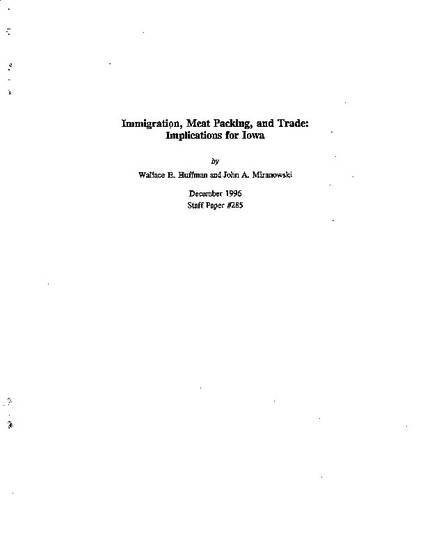
Article
Immigration, Meat Packing, and Trade: Implications for Iowa
Economic Staff Paper Series
Document Type
Report
Publication Date
12-1-1996
Number
285
Disciplines
Abstract
The objective of this paper is to examine changes in employment and wage patterns, industrial restructuring, and foreign competition that affect job opportunities of recent immigrants to the non metropolitan Midwest, especially to Iowa. The food and kindred products industry which includes meat packing and poultry slaughtering and processing is a significant employer of recent immigrants. The meat packing industry has a long history of employing immigrants, especially Irish and Polish immigrants during the first half of the 20th century. U.S. meat packing has undergone significant technical change and geographical relocation during the past 25 years. During 1945 to 1968, unions gained considerable wage advantage for hourly meat packing workers relative to other manufacturing workers. These relatively high wage rates of the unionized packing house workers were undoubtedly one of the contributing factors to these changes. The technical changes that occurred were somewhat unusual in that technical advances replaced a major component of skilled labor, the meat cutters, in meat packing and opened packing house employment again to less skilled workers, including recent immigrants. Hispanics, Asians, and Sudanese are groups represented in the Midwest.
Published As
This report is published in Huffman, Wallace E., and John A. Miranowski. Immigration, meat packing, and trade: implications for Iowa. Iowa State University, Department of Economics, 1996.
Citation Information
Wallace E. Huffman and John A. Miranowski. "Immigration, Meat Packing, and Trade: Implications for Iowa" (1996) Available at: http://works.bepress.com/john-miranowski/20/
